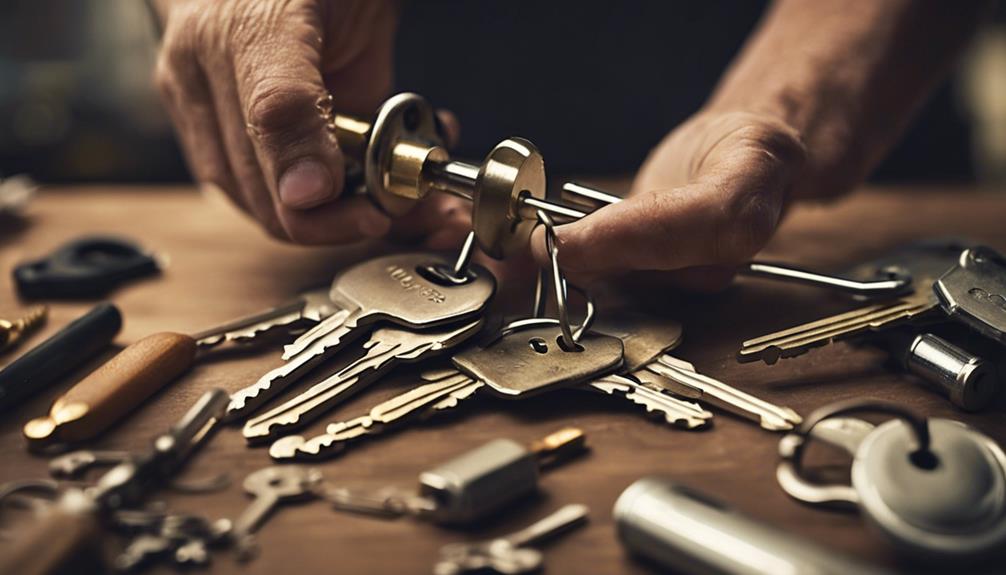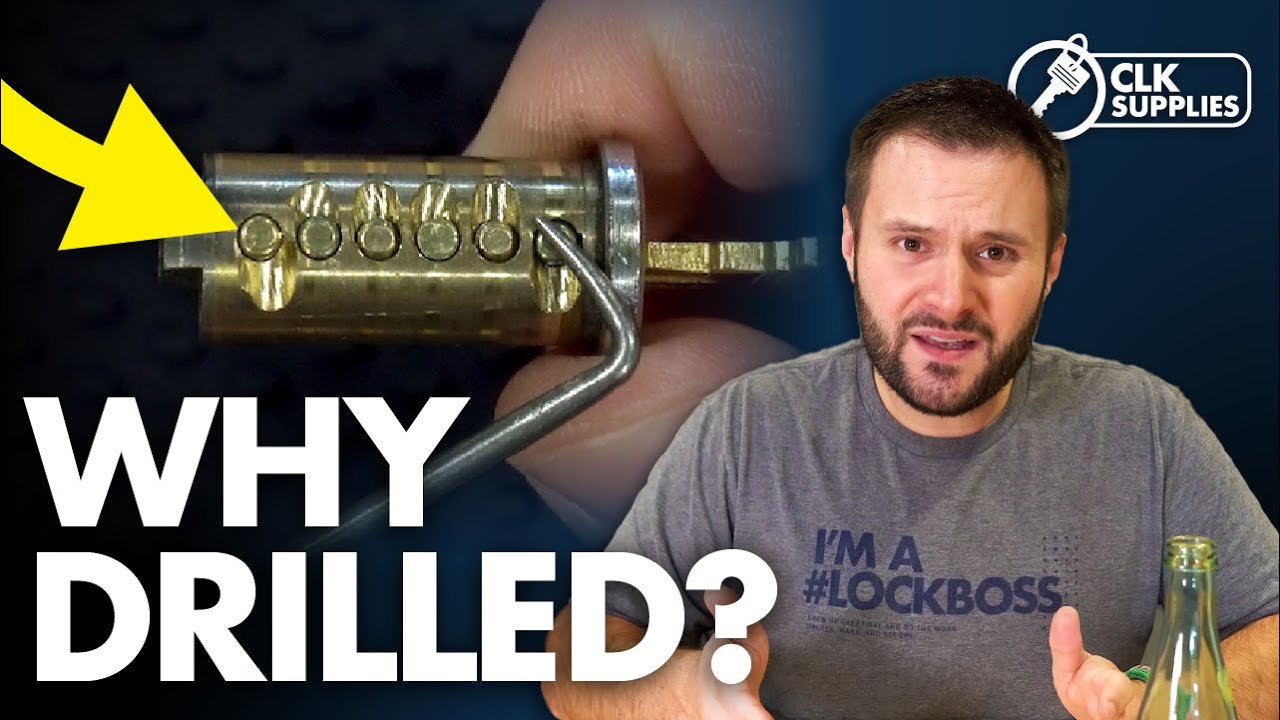When you're facing a lockout, re-keying your locks can be a swift and effective solution. This process changes the internal mechanics of your existing locks, making any lost keys useless and enhancing your security. It's especially important when moving into a new home or if you've misplaced your keys. Re-keying is quick, cost-effective, and can usually be completed in just minutes. By opting for this method, you regain control over access without needing to replace your locks entirely. Discovering how to choose a qualified locksmith can take your lockout management to another level.
Key Takeaways
- Re-keying enhances security by making old keys ineffective, ideal for lost keys or moving into new properties.
- The re-keying process is quick, typically completed in minutes, and cost-effective compared to full lock replacement.
- Consider re-keying after roommate departures, recent break-ins, or concerns about key duplication to maintain security.
- Hiring a qualified locksmith ensures proper re-keying, with considerations for licensing, experience, and transparent pricing.
- Prevent lockouts by establishing routines, creating spare keys, and utilizing keyless entry systems for better access control.
Understanding Lockouts
Lockouts can be frustrating and stressful moments that catch you off guard. Whether you're dealing with a residential lockout or a rental property lockout, it's crucial to understand the situation to effectively manage it. You might find yourself locked out due to lost keys, a malfunctioning lock, or even an unexpected tenant issue. Knowing how to respond can make all the difference.
One effective response is re-keying, which involves changing the lock's internal configuration so that old keys no longer work, providing an added layer of security for your property understanding lock re-keying.
When you face these lockouts, consider the option of rekeying for lockouts. This process allows you to change the internal configuration of the lock so that the old keys no longer work. It's a quick and cost-effective solution, especially for rental properties where tenant turnover is common.
Handling lockouts with rekeying not only secures your property but also gives you peace of mind.
Being proactive can help you avoid dire situations. Keeping spare keys with trusted friends or family members can be a lifesaver. Additionally, having a reliable locksmith on speed dial can expedite the process when you need immediate assistance.
What Is Re-Keying?
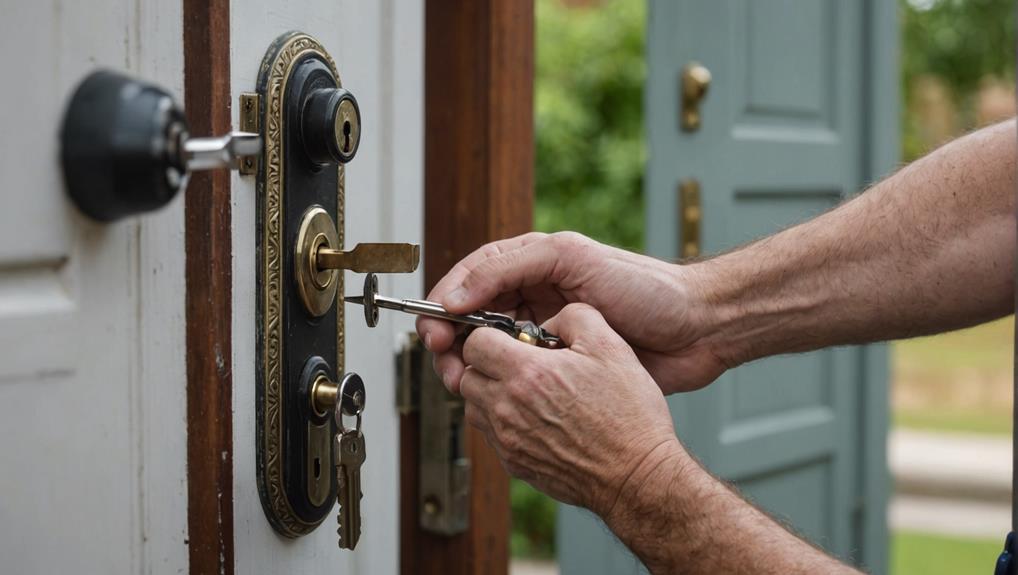
Re-keying is a straightforward process that can improve your security and resolve lockout issues efficiently. When you opt for this lockout rekeying solution, you're fundamentally changing the internal mechanisms of your lock so that old keys no longer work.
This method is particularly beneficial for both residential and commercial settings, especially if you've lost keys or need to restrict access. Additionally, many homeowners and business owners find re-keying to be a practical approach to unlocking savings without sacrificing safety.
Here are some key benefits of re-keying:
- Cost-effective: Instead of replacing entire locks, re-keying saves you money while still providing security.
- Quick turnaround: Most re-keying jobs can be done in a matter of minutes, meaning you can regain access and peace of mind swiftly.
- Enhanced security: By re-keying, you can ascertain that only authorized individuals have access, reducing the risk of unauthorized entry.
If you're dealing with commercial lockouts rekeying, this process can be an essential step in maintaining a secure environment for your business.
It allows you to take control and ascertain that your property remains protected without the hassle of complete lock replacement.
When to Consider Re-keying
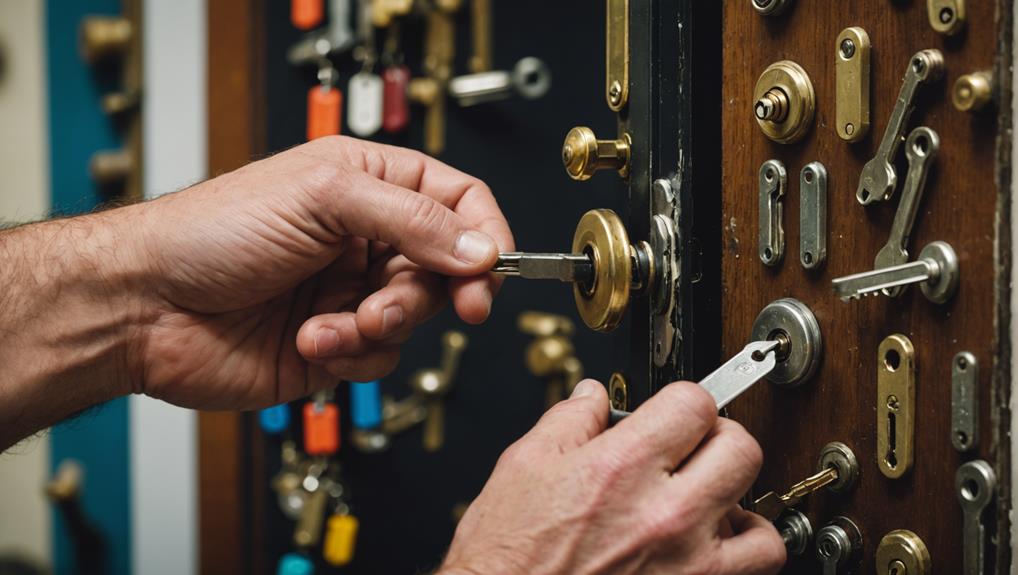
If you've recently moved into a new home or office, it's wise to contemplate re-keying. You never know who might still have a key to your space, and ensuring your safety should be a priority. Additionally, consider re-keying if you've experienced a security breach or if someone you trusted has left your life. It's about protecting yourself and those you care for.
Here's a quick guide to help you decide when to re-key:
| Situation | Consider Re-keying? |
|---|---|
| Moved into a new place | Yes |
| Lost your keys | Yes |
| Roommate or staff departure | Yes |
| Recent break-in or theft | Yes |
| Key duplication concerns | Yes |
Re-keying isn't just about changing locks; it's about taking proactive steps to secure your environment. When you think about the safety of your family, friends, or employees, re-keying can offer peace of mind. Taking action in these situations not only protects you but also serves those around you, creating a safer community for everyone involved.
Benefits of Re-keying
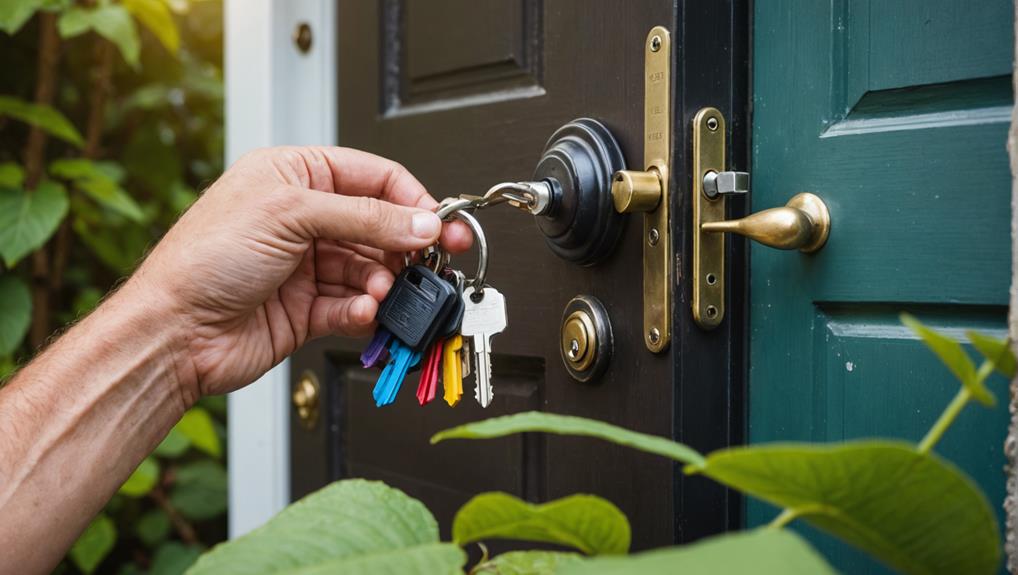
Re-keying offers a cost-effective way to enhance your security without the expense of a full lock replacement.
It can be particularly useful in situations where there are multiple keys in circulation or when moving into a new property.
By implementing detailed cost comparisons, you gain better control over who's access to your space, as you can easily manage and limit the distribution of keys.
Cost-Effective Security Solution
Considering the need for security and convenience, re-keying offers a cost-effective solution for those facing lockouts or security concerns.
This method allows you to enhance your security without the hefty price tag of a full lock replacement. You can quickly regain access and peace of mind without breaking the bank.
Here are a few key benefits of choosing re-keying:
- Affordability: Re-keying is typically much cheaper than replacing entire locks, making it accessible for everyone.
- Speed: The process can often be completed in a matter of minutes, allowing you to restore security promptly.
- Flexibility: You can easily adapt your lock system as your needs change, ensuring you always have control over access.
Enhanced Key Control
One of the standout advantages of re-keying is the enhanced control it provides over who's access to your property. By changing the locks and altering the key configurations, you can guarantee that only trusted individuals have entry. This not only protects your belongings but also fosters a sense of safety for everyone involved.
With re-keying, you can easily manage access for various groups, whether it's family members, employees, or service providers. If someone leaves your service or you've lent out a key, you can quickly re-secure your property without the costs and hassle of replacing entire lock systems. This flexibility empowers you to maintain a secure environment.
Moreover, enhanced key control allows you to establish a key distribution system that suits your needs. You can limit who's access to specific areas, guaranteeing that only authorized personnel can enter sensitive spaces. This level of oversight helps create a trustworthy atmosphere, benefiting everyone on your property.
In essence, re-keying not only strengthens your security but also simplifies how you manage accessibility, ultimately promoting peace of mind for you and those you serve.
The Re-keying Process
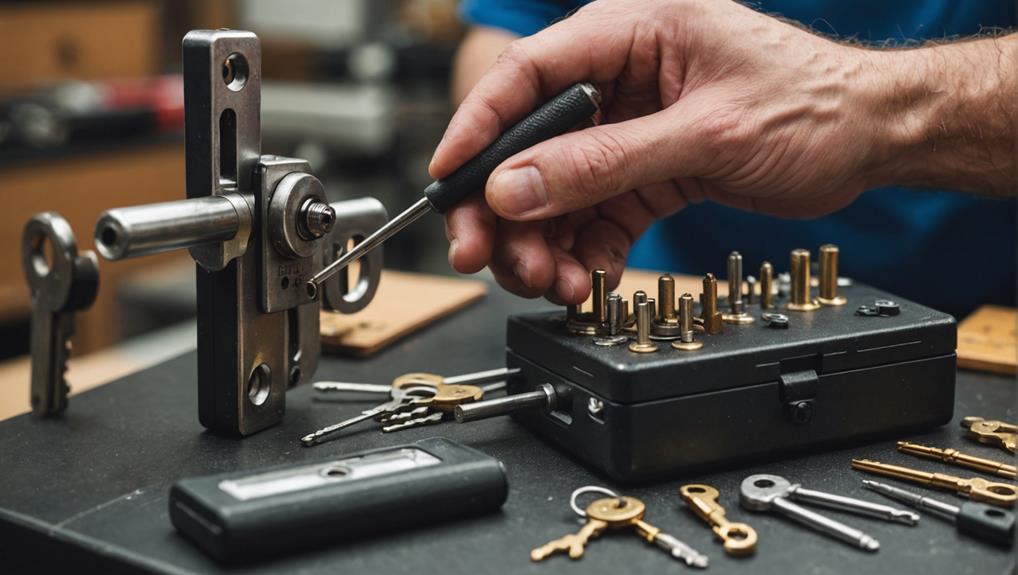
When you consider re-keying, it's important to understand the benefits it offers first.
The re-keying process involves specific steps that guarantee your new keys work effectively with your locks. This process specifically alters the pins and tumblers inside the lock mechanism, allowing for enhanced security and control over key access.
Understanding the re-keying process can help you appreciate how these changes improve your lock's functionality.
Let's break down what you need to know to make this change smooth and secure.
Understanding Re-keying Benefits
Re-keying your locks can be a game-changer when it comes to enhancing your home's security.
Whether you've moved into a new place or misplaced your keys, re-keying provides a simple and effective solution. By changing the internal mechanism of your locks, you guarantee that only the new key will work, giving you peace of mind.
Here are some key benefits of re-keying:
- Cost-Effective: Instead of replacing entire locks, re-keying is a budget-friendly option that saves you money while upgrading your security.
- Convenience: You can easily re-key multiple locks to work with a single key, reducing the number of keys you need to carry around.
- Quick and Efficient: The re-keying process is typically fast, allowing you to regain control of your home without extensive downtime.
Steps in Re-keying Process
Getting your locks re-keyed involves a straightforward process that you can tackle with a bit of preparation.
First, gather your materials: a re-keying kit specific to your lock type, screwdrivers, and any additional tools you might need.
Next, start by removing the lock cylinder from your door. This usually requires unscrewing the screws holding it in place.
Once you have the cylinder, follow the instructions in your re-keying kit. Most kits will guide you through removing the old pins and replacing them with new ones that match your new key.
After you've replaced the pins, insert the new key to guarantee it turns smoothly. This step's vital, as it verifies that everything is aligned correctly.
Once you're satisfied, reassemble the cylinder and reattach it to your door.
Choosing a Qualified Locksmith
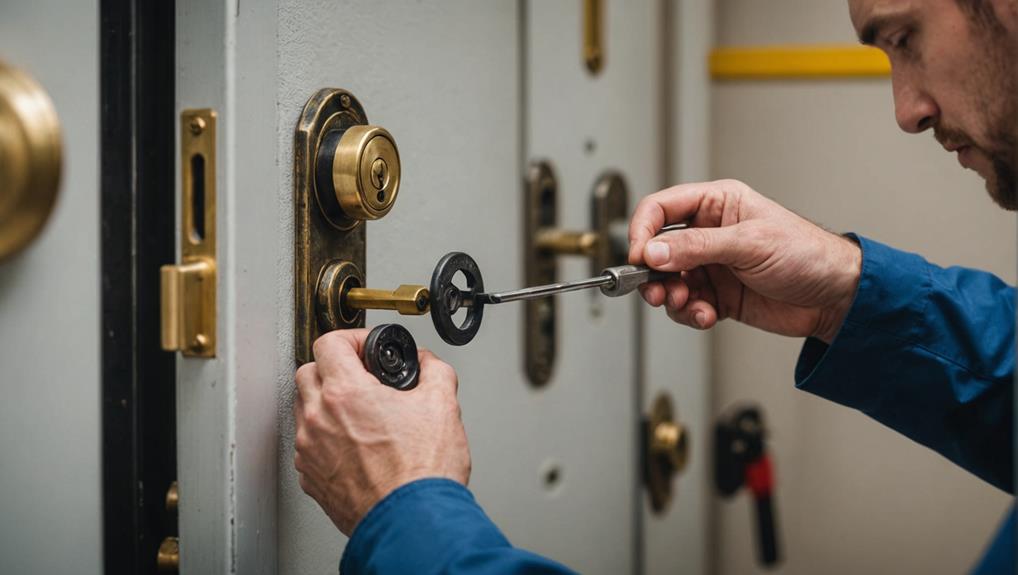
Finding a qualified locksmith can make all the difference when you're facing a lockout situation. You want someone who not only understands the technical aspects but also values your safety and peace of mind.
To guarantee you choose the right professional, consider asking the locksmith specific questions about their services and essential tips for choosing a reliable locksmith.
Here's what to look for when choosing a locksmith:
- Licensing and Insurance: Confirm the locksmith is licensed and insured. This protects you against potential damages during the service.
- Experience and Reputation: Check their experience and customer reviews. A locksmith with a solid reputation is more likely to provide reliable service.
- Transparent Pricing: Look for someone who offers upfront pricing. Avoid locksmiths who give vague estimates, as this can lead to unexpected charges.
Tips for Preventing Lockouts
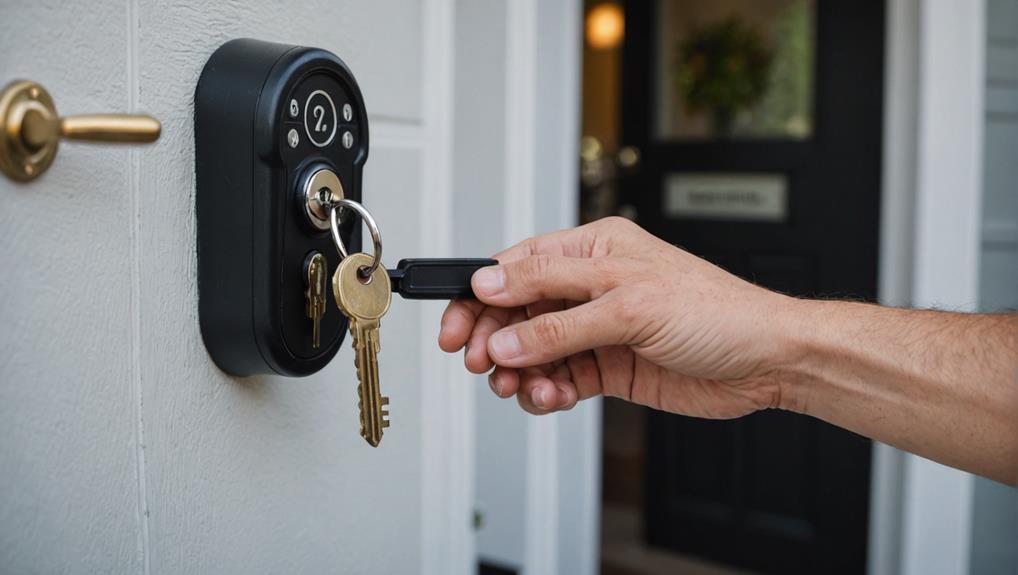
Lockouts can be a frustrating experience, but there are effective strategies to help you avoid them. Start by establishing a routine. Always check that you have your keys before leaving home or your car. It might seem simple, but it can save you a lot of hassle.
Additionally, consider the advantages of smart locks, which offer a keyless entry option and can enhance your home security Smart Locks: Weighing the Benefits.
Next, consider getting a spare key made. You can give one to a trusted friend, neighbor, or family member who can help you in case of emergencies. It's a small gesture that can make a big difference when you need it most.
Additionally, invest in keyless entry systems. Smart locks and keypads can provide a convenient alternative, reducing the risk of losing or misplacing your keys.
Lastly, keep your living space organized. Designate a specific spot for your keys and always return them there, so you know exactly where to find them.
Alternative Solutions to Lockouts
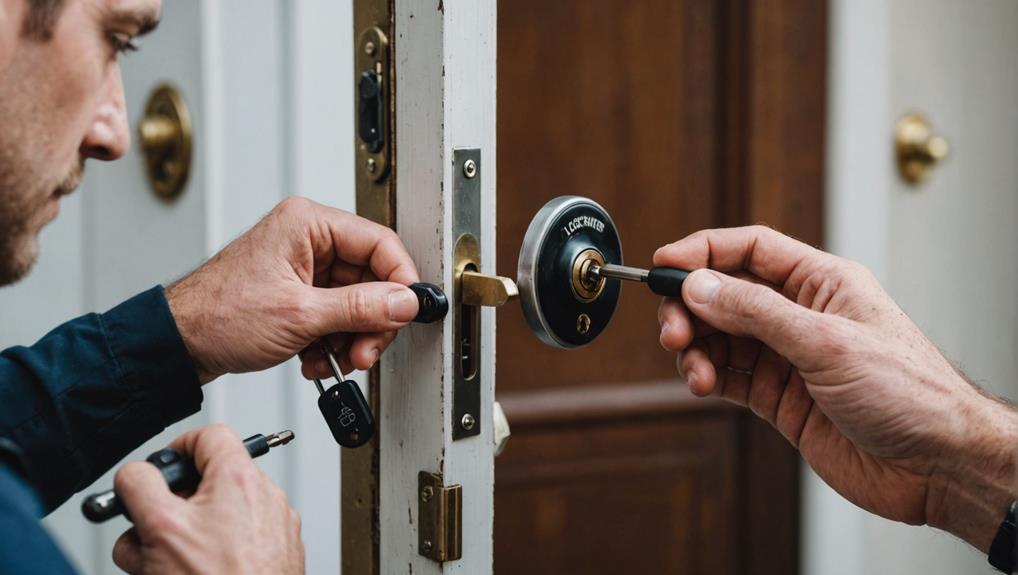
When you're faced with a lockout, there are several alternative solutions that can help you regain access without the stress of waiting for a locksmith. These options can save you time and provide peace of mind, especially if you're in a hurry or helping someone in need.
However, it's important to know when to call a professional locksmith for help, as they can provide expertise in situations that may require specialized tools or knowledge, such as when to call a professional locksmith.
- Spare Key Access: Consider giving a trusted friend or family member a spare key. This way, they can help you out in case of an emergency, ensuring you're never locked out for long.
- Lockout Service Apps: Many cities now offer lockout assistance through apps. These services connect you with local professionals who can help you get back inside quickly, often at a lower cost than traditional locksmiths.
- DIY Techniques: If you feel comfortable, you might try some safe DIY methods. Using a credit card on spring bolt locks or a coat hanger for older door types can be effective, but proceed with caution to avoid damaging your locks or doors.
Maintaining Your Locks
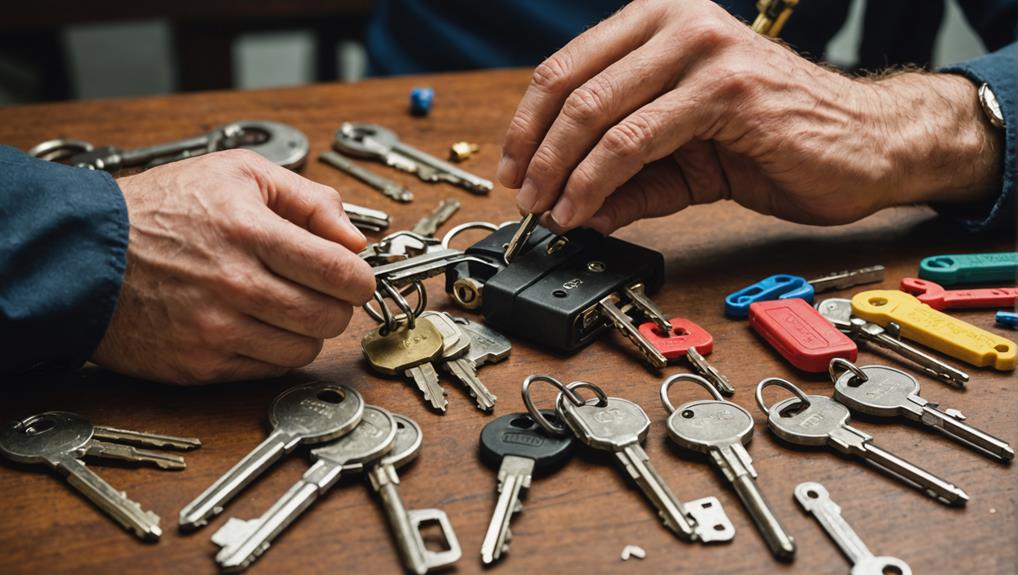
Regular maintenance of your locks is essential for guaranteeing their longevity and functionality. By taking a few simple steps, you can serve others by providing a secure environment.
Start by inspecting your locks regularly for any signs of wear or damage. If you notice rust, dirt, or debris, clean them promptly to prevent malfunction. Proper care can also help avoid sticking lock issues that may arise over time.
Lubrication is key to keeping your locks in top shape. Use a graphite-based lubricant to guarantee smooth operation. Avoid oil-based products, as they can attract dirt and grime over time.
Additionally, check the alignment of your locks and door frames. Misalignment can cause unnecessary strain and lead to lock failure.
Don't forget about your keys! Keep them clean and free from bending or breaking. This small effort goes a long way in guaranteeing that you can always access your space when needed.
Lastly, if you're ever uncertain about the condition of your locks, consider consulting a professional locksmith. Regular upkeep not only enhances security but also shows your commitment to providing a safe environment for everyone around you.
Frequently Asked Questions
How Much Does Re-Keying Typically Cost?
When you're considering re-keying, it typically costs between $50 to $150 per lock, depending on the complexity and your location.
If you have multiple locks, the price might vary. You'll also want to factor in any service fees from a locksmith.
It's a smart investment for security, ensuring only you have access. Always get a quote beforehand, so you know exactly what to expect without any surprises.
Can I Re-Key My Locks Myself?
Yes, you can re-key your locks yourself if you have the right tools and a bit of DIY know-how.
Most lock re-keying kits come with instructions that guide you through the process. You'll need to remove the lock, take it apart, and replace the pins to match your new key.
Just be sure to follow the instructions carefully. If you're unsure, though, it's always a good idea to call a professional for help!
How Often Should I Consider Re-Keying My Locks?
Ever thought about how often you should re-key your locks? It's more essential than you might think.
Consider doing it every time you move to a new place or after a breakup. If you've lost a key or had someone suspicious near your home, it's time to act.
Regularly re-keying not only boosts your security but also gives you peace of mind. Stay proactive, because safety's always worth the effort!
Does Re-Keying Affect My Home Insurance?
Re-keying your locks can affect your home insurance, but it often depends on your policy.
When you change your locks, you should notify your insurer to guarantee coverage remains intact. Some policies may require you to maintain certain security measures, and failing to inform them could result in complications during a claim.
Always check with your insurance provider to clarify how re-keying fits into your specific policy requirements. It's a smart move!
What Types of Locks Can Be Re-Keyed?
Imagine your home as a fortress, where the right locks serve as your sentinels.
You can re-key various types of locks, including pin tumbler locks, smart locks, and some mortise locks.
It's like giving your fortress a fresh set of keys, maintaining security while welcoming peace of mind.
Conclusion
To sum up, re-keying can be a lifesaver when dealing with lockouts, especially since nearly 1 in 4 people experience a lockout at some point in their lives. By understanding the re-keying process and knowing when to call a qualified locksmith, you can regain your peace of mind. Remember, prevention is key—take steps to safeguard your locks and avoid the frustration of being locked out. Don't wait for an emergency; be proactive and protect your home today!

